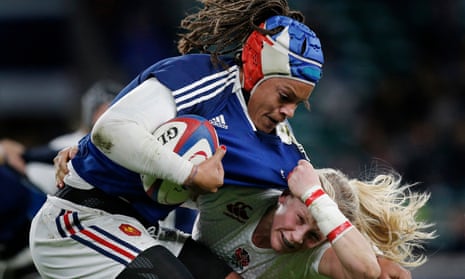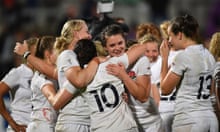On Saturday, England’s Six Nations campaign kicks off with a sellout game against France at Twickenham. Eighty thousand eager fans will turn out to see Eddie Jones’s men defend their grand slam title. And immediately afterwards, England women will take to the same sacred turf against defending champions France. If past experience is anything to go by, less than a quarter of the crowd will stick around to watch.
Is the double header – when played by the equivalent mens and women’s teams – a victory for women’s sport? It was conceived as an opportunity for women to play on the same stage as the men, offering exposure – and broadcast deals – for games that would otherwise struggle for airtime. But when those TV images show largely empty stands, as chilly spectators decide that a quick exit to a cosy pub is preferable to another two hours of free entertainment, will the instant comparison with the men’s game do women’s sport a disservice?
Former England flanker Maggie Alphonsi made her international debut in 2003. When she played in her first double header at Twickenham, she remembers that “it felt like there were more stewards than spectators”. The women’s match was scheduled before the men’s, and as all support acts know, it is hard to compete with the lure of the bar before the main event.
Since the women’s games were moved to follow the men’s, however, Alphonsi has watched the numbers grow. A crowd of 13,000 may leave a lot of empty seats at rugby union’s capacious home, but it is a huge improvement on the 4,000 who would attend an England women’s game anywhere else. “Plus the TV channels won’t show the game if you play beforehand, because they’ve got to give you the buildup. Now the game gets broadcast and that brings more people in, too,” she says.
Cricket has also found double headers to be a useful marketing ploy. The ECB has just announced that women’s domestic cricket will be making its TV debut this season, with six Kia Super League games to be played alongside the men’s T20 competition, Natwest Blast, at major stadiums. “To have men and women playing on the same pitch, shown on the same TV channel, with the same commentary team, is part of this normalising process that we’re all trying to speed up as quickly as we can,” says Clare Connor, the former England captain who is now director of women’s cricket at the ECB.
“We played a standalone women’s T20 against Australia at Hove in 2015 and sold it out, 6,000 tickets. That doesn’t just happen: the double headers were a really good launchpad.”
The format of two short-form games may be particularly suited to cricket lovers, for whom the idea of spending six hours in a ground is not unusual. In football, however, there has been more resistance to the idea. It is hard for marketers to compete with matchday rituals such as the pre-match burger or post-match pint, and some clubs have refused to allow women to play on their precious pitches. “Because obviously those nine-stone women really churn up the surface,” jokes Jen O’Neill, editor of shekicks.net, the women’s football magazine. “Perhaps they worry their high heels might damage it.”
Rare clubs such as Manchester City will schedule women’s matches after a men’s game, but play them on the academy pitch next to the main ground. But O’Neill is worried that double headers can devalue the women’s game. “We’re trying to get to a point where we’re arguing that women’s sport is valuable in its own right,” she says. This year the FA is aiming to attract upwards of 40,000 to the SSE women’s FA Cup final by marketing specifically to families: nearly half the crowd last year were children, who go free when an adult ticket is bought.
Other sports, too, are turning away from the notion that they need to cannibalise existing audiences and focusing their attention on a largely untapped market: women and girls. Matt Cook, England netball’s marketing director, sees it as a benefit that netball has no men’s team to be compared to: “It’s rare in sport where you can say, unarguably, that the best players in the world are women.”
Two years ago, England netball internationals could not raise a crowd of a couple of thousand. Now, they have a regular place in the Sky Sports schedule, and sell upwards of 7,000 for games at Wembley Arena, London’s Copper Box and Birmingham’s Genting Arena. Uniquely, the crowds at their matches are more than 80% female. Cook says that for sports such as cricket and rugby, developing under the shadow of the men’s game is both a blessing and a curse: their resources are much greater “but the downside is the psychology”, namely comparisons with the men’s game.
Even Connor points out that the England women’s cricket team are engaging in a number of standalone marketing campaigns, adding: “We’re probably getting towards the point where you want to make a statement about women’s sport standing on its own two feet.”
Meanwhile Cricket Australia – an organisation whose forward-thinking commercial nous established the hugely successful Big Bash League – has persuaded the ICC to take the bold step of staging the women’s T20 World Cup entirely separately from the men’s when it hosts both events in 2020. “Lots of people might say that’s a gamble, but their research was really compelling,” says Connor.
If double headers really are working, they may soon be making themselves obsolete.







